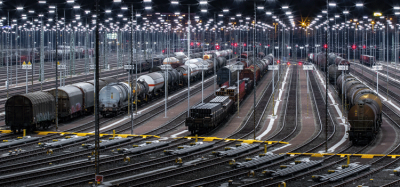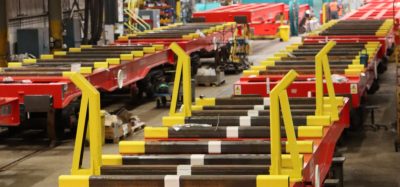Looking beyond national borders
Posted: 28 January 2010 | | No comments yet
CFL cargo, created in October 2006, aims to offer customer-oriented pan-European door-to-door rail freight services, while creating shareholder value and adhering to high social, safety and environmental standards.
CFL cargo, created in October 2006, aims to offer customer-oriented pan-European door-to-door rail freight services, while creating shareholder value and adhering to high social, safety and environmental standards.
CFL cargo, created in October 2006, aims to offer customer-oriented pan-European door-to-door rail freight services, while creating shareholder value and adhering to high social, safety and environmental standards.
In spite of its young age, CFL cargo offers a full service range, including regional and international freight transport, rental and repair of wagons, and other services. This depth of expertise in railroad operations is due to the fact that the company was created by merging the cargo division of the national railway company of Luxembourg, CFL, with the internal rail division of the Luxembourg mills of ArcelorMittal, the world leader of the steel industry.
Through its subsidiaries CFL cargo Deutschland and CFL cargo Danmark, as well as its licenses in France and Belgium, CFL cargo operates across several European countries. The international operations are made possible by a fleet of multi-system locomotives and by a multinational and multilingual staff of train drivers, many of whom speak several languages and hold locomotive driving licences for more than one European country.
Global activities
Expanding beyond the borders of Luxembourg is a condition for survival in the case of CFL cargo, given the limited size of the Luxembourg market. CFL cargo started expanding activities beyond Luxembourg even before the official liberalisation of rail freight in Europe on 1 January 2007, by launching feeder traffics in the surrounding SaarLorLux region – home to several production sites of ArcelorMittal – as early as December 2006.
While steel products do represent a major part of CFL cargo’s traffics, the company is aiming to diversify its client/product base, in addition to the current geographic diversification. CFL cargo also transports merchandise such as paper, chipboard, construction materials, coke/coal and chemicals, and this proportion of non-steel products transported by CFL cargo is on the increase.
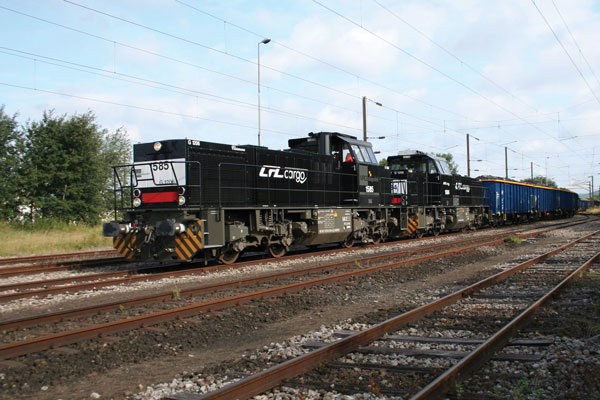

In the second half of 2009, CFL cargo launched a transport of coke from Poland to various destinations in Northern France
The strategic geographic location of Luxembourg, in the heart of Europe, enables the company to operate on the main European North-South and East-West routes in cooperation with its subsidiaries CFL cargo Deutschland and CFL cargo Danmark. In those cases when the optimal solution for a customer’s transportation need includes a local provider, CFL cargo is also partnering up with other rail freight companies.
Several international traffics have been launched since 2007, with destinations in Belgium, Denmark, France, Germany, Holland, Italy, Poland and Spain. The geographical expansion activity has continued in 2009 in spite of the worldwide economic crisis, thanks to our commercial team’s proactive business development approach.
CFL cargo’s main transport relations at the end of 2009 were:
- In cooperation with the European Single Wagon Network Operators: Luxembourg to/from Germany, Belgium, France and Switzerland
- In Open Access: France to Luxembourg and also Germany to Luxembourg, Denmark, Netherlands and France
- In Open Access through partnerships: Luxembourg and France to Italy and also Poland to France and Belgium
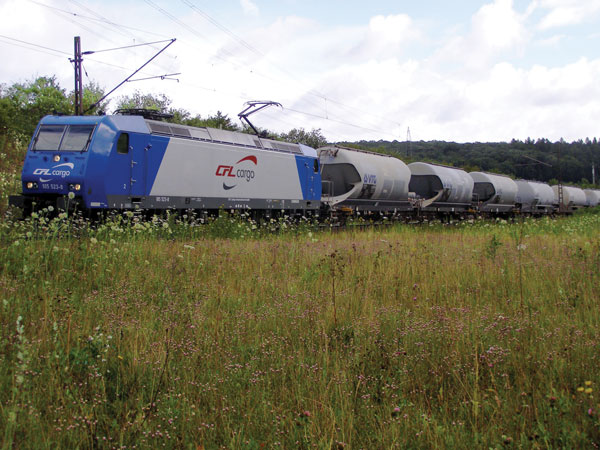

CFL cargo operates across several European countries
Main developments in 2009
Three major new traffics were launched in the past year.
In the spring of 2009
CFL cargo started transporting steel billets from the German cities of Hamburg and Duisburg to the steel mills in Luxembourg and the surrounding regions. These open access transports are carried out in cooperation with CFL cargo Deutschland.
In June 2009
CFL cargo started its first long distance open access transport of billets in France, from Trith St Léger near Valenciennes (FR) to Schifflange (LU). This new traffic marked a historic milestone because, between Valenciennes and Trith St Léger, the train was operated by Fret SNCF as a subcontractor.
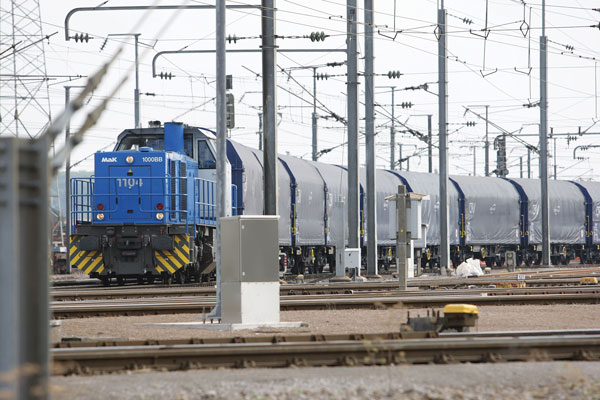

CFL cargo is optimistic about the future
In the second half of 2009
CFL cargo launched a transport of coke from Poland to various destinations in Northern France. These trains are operated in cooperation with PKP Cargo or CTL Logistics in Poland, with EKO Transportgesellschaft or CFL cargo Deutschland taking over at the Polish-German border.
These different new transports are in addition to the traffics already launched during the previous years. One example is the transportation of paper and other products to Lérouville, a logistics hub in France. Another example is the transportation of finished steel products from the ArcelorMittal mills in the Lorraine region of France to steel customers in Northern Italy, in cooperation with SBB Cargo.
Ad hoc transports
CFL cargo also operates ad hoc transports that are planned on short notice, on an ‘as needed’ basis rather than being based on a long-term plan or schedule. Examples of such ad hoc trains are:
- From April until June 2009, CFL cargo operated five trains transporting grains between Rotterdam (NL) / Antwerp (BE) and Kleinbettingen (LU)
- In May 2009, CFL cargo started running trains of wood (to evacuate the trees fallen during severe storms) between Southwest France and Luxembourg, in cooperation with Fret SNCF
CFL cargo also transports scrap metal on an ad hoc basis, mainly between the Moselle river ports and the ArcelorMittal mills in Luxembourg. Another example consists of ad hoc scrap trains between Aubange (BE) and Pont-Saint-Vincent near Nancy (FR).
Onwards and upwards in 2010
CFL cargo is optimistic about the future and expects a higher level of activity and diversification already in 2010. After the sharp decrease in activity since late 2008 and throughout 2009, CFL cargo is looking forward to an increase in volumes for existing traffics and to the continuous development of new traffics throughout Europe. This will be made possible by the gradual recovery of the world economy, among others of the steel industry, and also by the internal optimized organisation of CFL cargo.
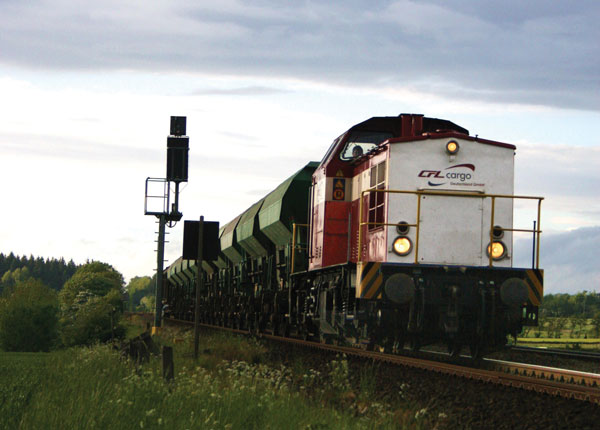

CFL cargo is looking forward to an increase in volumes for existing traffics and the continuous development of new traffics throughout Europe
CFL cargo is looking forward to an increase in volumes for existing traffics and the continuous development of new traffics throughout Europe
From the beginning of its creation, CFL cargo started a restructuring project to transform the former state-run and passenger-centred organisation into a private, customer-oriented freight structure. Recently, CFL cargo was able to take advantage of the lower level of activity in the past months to accelerate this internal restructuring project. In the liberalised European rail freight environment, the move towards a high-performing, flexible and customer-oriented rail freight enterprise is a necessary challenge.
In conclusion, with its restructuring almost complete, the combined strengths of its multinational workforce, fleet, licenses and subsidiaries, in addition to its drive to succeed, 2010 bodes well for CFL cargo.
The CFL cargo commitment
CFL cargo has adopted the strong safety culture of CFL in the domain of transportation. In addition, CFL cargo can fall back on the risk management experience of ArcelorMittal in the steel industry. For this reason, CFL cargo combines the sustainable development of rail freight with the social responsibility of the company. The safety & health policy of CFL cargo is an essential part of this goal. The management of CFL cargo commits to further develop and promote this safety and health culture inside the company, in cooperation with personnel representatives. The Safety and Health Charter concerns all CFL cargo employees, customers, service providers, material suppliers, as well as everybody in direct or indirect contact with the activities of CFL cargo.
The goal of CFL cargo is to become a reference in the domains of safety and health for all partners.
In 2008 to 2009, CFL cargo also developed a safety and quality management system (SMS & QMS), which provides the company with a solid basis for continuous improvement and enables it to be competitive in the global market. The project resulted in the SMS and ISO:9001 certifications of CFL cargo in spring 2009.
CFL cargo in figures
More than 440 people at CFL cargo are responsible for rail freight in Luxembourg and beyond its borders.
With a fleet of 62 locomotives and 4,000 freight wagons, perfectly adapted to the needs of the customers, CFL cargo transports more than 8.5 millions tonnes of diverse products each year. Every day, more than 1,000 CFL cargo freight wagons leave the Bettembourg marshalling yard to transport goods to more than 21 countries.
In a process of ongoing development, CFL cargo continuously invests in its fleet to meet the customers’ needs and satisfy requirements in the areas of security, quality and respect for the environment.
In the heart of Europe
The Grand Duchy of Luxembourg and the SaarLorLux region are strategically located in the centre of the European railway network. They are the crossroads that connect the logistically important North-South and East-West axes.
And in the near future, CLF cargo aims to become the number-one in train freight in the greater SaarLorLux region.
Visit www.cfl.lu for more information
About the authors
Fernand Rippinger


Fernand Rippinger
Fernand Rippinger started his career in 1981 at the Institute for Process Control of the University of Karlsruhe. He switched in 1986 to the Process Automation Department of ARBED Research in Luxembourg. He managed several process automation projects within the ARBED mills in Luxembourg as well on an international level, namely in Germany, the UK and the United States. In 1996, he took over the international purchasing coordination for ARBED Group, where he led several international projects in energy, telecom and transportation. During the creation of the steel group Arcelor in 2001, he was involved in the set-up of the purchasing organisation. Within Arcelor, he was responsible for the consolidation of purchasing of the long product mills and for a number of major purchasing projects. In 2006, he was appointed as CEO of CFL cargo, a joint venture between CFL and ArcelorMittal.
Marc Polini


Marc Polini
Marc Polini started his career in Vevey (Switzerland) in 1987, as an engineer for international projects at Nestlé. After the implementation of a drink production and packaging line on an international scale, he became Project Manager in the areas of civil engineering and installation of electrical and mechanical equipment. In 1991, he joined Ceramétal in Luxembourg in the role of maintenance and security manager and in 1994 he switched to Data Documents as Production Planning Manager. In 1996, he joined Mairwais International as electrical and mechanical equipment Purchasing Manager, in Europe and in the Middle East. In 1999, he joined EuroLuxCargo, predecessor of CFL cargo, as the Head of the Commercial Department and Wagon Management. At the creation of CFL cargo in 2007, he assumed the role of Chief Commercial Officer.



